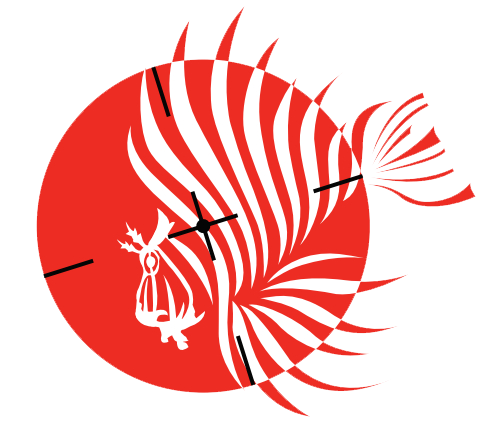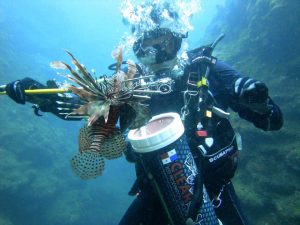Yes, you CAN safely hunt the invasive and venomous lionfish.
Despite what you have heard and read about the sting of the venomous lionfish and how painful it is (all true), there are still a few straightforward and simple rules that you can follow which will allow you to comfortably and safely hunt lionfish. If you are still wondering WHY we hunt the invasive lionfish, please read this article first.
The most important part of lionfish hunting is to first be comfortable with your diving skills, the conditions, and environment.
We usually recommend that lionfish hunters have an advanced certification from one of the dive training organizations and enough dives under their weightbelt to be comfortable with the key diving skills of buoyancy control, monitoring air consumption, and underwater navigation. Remember, safe diving should ALWAYS come first and chasing after fish is a secondary objective. Too many spearfishing accidents have happened because the diver lost focus of the diving part and got tunnel vision focused on the capturing fish part.
Just as in many other endeavors, having the right equipment is essential to safely hunting lionfish. There are many equally capable spears and devices for shooting the lionfish such as the Neritic pole spear, the Foldspear, Bandito breakdown polespear, JBL spear, Lionfish Slayer, and many others. Because the lionfish has no native predators in the invaded range they will let you get very close so complicated and powerful spearguns are not needed for hunting the lionfish.
The most important piece of gear for successful lionfish hunting is the puncture proof container.
While many people like to carry shears or scissors underwater with them and trim the venomous spines while underwater so that they can carry the lionfish safely, we much prefer using a container and recommend it to others for several reasons. One reason is that most people don’t truly understand which of the spines are venomous and we often see people cutting off the non-venomous pectoral fins while leaving the small venomous spine on the pelvic fin. The primary reason why we do not recommend trimming the lionfish spines underwater though is that many people have been stung because the fish is still alive and starts flopping while the hand is next to the fish trying to trim. It is much easier and faster to spear the lionfish and then simply insert it into the container, scraping the fish off by pulling the spear back out of the opening. The most popular container on the market today is the Zookeeper, which has a clear see-through puncture proof wall and a funnel style opening. Click here to learn everything you ever wanted to know about the Zookeeper Lionfish Containment Unit. Using a container such as the Zookeeper allows a diver to quickly and safely harvest as many lionfish as possible without wasting valuable bottom time clipping spines off the lionfish. Once back on the boat the diver can open the bottom and dump the lionfish out into a cooler without ever having touched the fish and with very little risk of being stung. We highly recommend adding the optional handle to your Zookeeper and installing it about 6 inches back from the funnel opening to allow you to safely hold the container while inserting your lionfish.
We also suggest a pair of puncture resistant gloves for handling lionfish.
The Hexarmor 9010 puncture resistant gloves are still flexible enough to comfortably wear during all of your diving and also provide a piece of mind that comes with protecting your hands from the lionfish spines. Without a doubt, the hands are the most commonly stung part of the body and while these gloves only cover the palm and sides of the fingers, they are very useful especially when picking lionfish up while back on the boat or cleaning. The key technique however is to NEVER TOUCH THE LIONFISH while underwater. With a proper container and a good pole spear there is no need to touch the lionfish while diving, and if you keep this in mind you can safely shoot hundreds or thousands of lionfish without being stung.
Carelessness is the number one enemy of the lionfish hunter.
Talk to enough experienced lionfish hunters and ask them about their stings and you will soon realize that carelessness is the leading cause. Holding their hand at the mouth of the container while inserting the lionfish, looking away while inserting the lionfish, trying to grab the lionfish and reorient it before inserting into the container, or even bumping into a lionfish while dealing with another are all common ways in which divers have been stung and all could be prevented by maintaining a little more focus. We must always be on guard against complacency, because once you have successfully speared and collected hundreds of lionfish it’s easy to let down your guard, so stay vigilant!
A common way to get stung by a lionfish is while cleaning them or handling them on the boat. I know that I’m not alone in saying that I’ve speared thousands of lionfish without any problem in the water only to get stung at home while cleaning the fish. The lionfish can be filleted just like any other fish, but you still must be careful because an iced down lionfish still has the capability of stinging a person since only heat breaks down the venom. We recommend wearing at least one of the puncture resistant gloves for handling the lionfish while filleting, and personally I prefer to keep my knife hand glove-free to better control the knife. Please be mindful of the carcass after filleting, because the spines are needle like and can puncture right through garbage bags!
Lionfish hunting CAN be done safely if you follow these tips.
Many, many divers have harvested hundreds or thousands of lionfish without being stung by following these safety standards. Stay focused, wear puncture resistant gloves, and use a container such as the Zookeeper and you too can safely enjoy the exhilarating hunt for lionfish. If despite all these precautions you do still get stung while diving, remember to safely ascend, and if you get stung above or below the water follow these steps for lionfish sting first aid treatment.
Good luck, and Happy Hunting!




Recent Comments